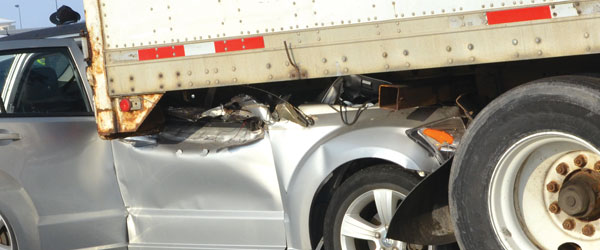18-Wheeler Accident FAQs
We offer answers to frequently asked questions in the wake of a serious truck accident until you have the chance to discuss your accident and injuries during a free case evaluation with our 18-Wheeler Accident Lawyers. Please use the links below to find the information you need.
- What are the common causes of truck accident?
- Do I need to file a police report?
- How Do I Get a Copy of the Police Report After My Accident?
- How do I deal with trucking companies or their insurance carriers after a truck accident?
- Is my case any different if I am injured, or a family member is killed, by a truck as opposed to any other vehicle driver?
- Are trucking companies regulated by the Federal Government?
- Does federal law limit the hours that a trucker can operate his or her truck?
- Are trucks required by federal law to carry insurance?
- Who can sue in a truck accident injury or death case?
- Who can be sued in a truck accident case?
- How important is investigation in a truck accident case?
- Are expert witnesses necessary to prove fault in a truck accident case?
- What damages can I, or we as the survivors of a loved one, recover in a truck accident injury or death case?
- How soon must I bring an injury or death case based on a truck accident?
- Do I need an attorney to litigate my truck accident case?

What are the common causes of truck accident?
In a truck accident there may be a multitude of reasons that the truck accident occurred in the first place. Some of the most common causes of trucking accidents include:
- Lack of training on the part of the truck driver
- Overloaded or oversized trucks
- Poorly maintained brakes, lights, computer systems and other faulty equipment and maintenance
- Truck driver inexperience
- Truck driver fatigue due to driving too long and too many hours without rest
- Speeding over the limit or driving at speeds or beyond the road and weather conditions
- Running off the road
- Failure to yield the right of way
- Aggressive driving behavior
- Truck driver inattention due to use of onboard computers, e-mail or texting while driving
- Truck drivers under the influence of drugs and alcohol while driving
- Driving the truck in bad weather conditions
- Driving in conditions of poor visibility due to smoke, fog, snow or rain
- Dangerous or reckless truck driving with a long record of wrecks and accidents
- Improper or defective safety systems, reflectors, lights and other warning devices
- Failure of truck to have installed an underride protection/under guards
Do I need to file a police report?
Yes. Especially when there are injuries involved. Accident reporting requirements include:
- Report any accident to police as soon as possible to file a report
- Always remain at the scene until you have collected insurance, names, addresses, and license plate information from the other drivers involved.
- If you are too injured, usually the occupant in your vehicle (if there is one), or a bystander can phone contact the police.
Accidents with commercial vehicles require a police report, even when little damage occurs. If you are in a minor accident with a big rig or semi, it will always be a commercial vehicle.
How Do I Get a Copy of the Police Report After My Accident?
You can order a Texas crash report through the Texas Department of Transportation’s Crash Records Information System (CRIS). If you reside in any other state, check with your local police department for the best way to order a copy of your report.
How do I deal with trucking companies or their insurance carriers after a truck accident?
One thing you have to know is that you are not negotiating on level ground when dealing with a trucking company after an accident. Most trucking companies are highly skilled at auto truck accident investigation and claims practice. These adjusters represent the truck company, not you. Do not give them any type statements or sign any releases for medical records or employment records. Often the medical release allows the adjuster to talk to the doctors without you or anyone being present.
Truck companies have accident investigators that are on call and dispatched to the scene of the crash as soon as the trucking company learns there has been an accident. Furthermore, while the families of the accident victims are tending to medical and hospital care or funeral arrangements, the trucking company is investigating the accident and setting up their defense.
This is why the victims of big rig truck accidents need to also have a team of investigators on their side, fighting for their rights. Miller Weisbrod Olesky, LLP, has the necessary resources to investigate an accident within hours and the ability to file the required paperwork to secure the evidence before it is destroyed.Contact us for more information.
Is my case any different if I am injured, or a family member is killed, by a truck as opposed to any other vehicle driver?
Yes. Although the same laws of negligence will apply, there are special Vehicle Code sections which apply only to commercial truck drivers and trucking companies. There are also special licensing and training requirements for truck drivers which generally make truck accidents harder to defend and easier to win for plaintiffs. In addition, truckers and their employers are required by law to maintain various documents that are critical in prosecuting truck cases. These documents are often destroyed by the trucking companies if not secured shortly after the incident occurs.
Are trucking companies regulated by the Federal Government?
Yes. The Federal Motor Carrier Safety Administration establishes rules and regulations which govern commercial motor vehicles and the companies who operate these vehicles. Their stated purpose is to attempt to make the interstate highways safer.
Does federal law limit the hours that a trucker can operate his or her truck?
Yes. Since 1939, federal law has placed restrictions on the "hours of service" that a trucker may operate his or her truck. Recent changes have been made to these rules for the first time in over 60 years. These rules are designed to promote safety by helping to ensure that truck drivers are getting the needed rest to operate their big rigs safely.
Are trucks required by federal law to carry insurance?
Yes. Federal law requires commercial vehicles traveling in interstate commerce to carry $750,000 of insurance for bodily injury and property damage. Most state laws also impose minimum insurance requirements on trucks not covered under federal law. For example, Texas requires trucking companies to carry at least $500,000 of liability insurance.
Who can sue in a truck accident injury or death case?
Anyone who is injured or has had a loved one killed in a truck accident can sue as long as some other person or entity is at fault for the accident. This includes adults and children (who can sue through guardians or parents) and even truck drivers if another person or entity was at fault for the accident.
Who can be sued in a truck accident case?
How important is investigation in a truck accident case?
Investigation is critical. If the truck was commercially owned, in most situations large trucking companies will perform their own investigation immediately after the accident. This puts you at a great disadvantage. It is important that you retain an attorney who immediately investigates the case so he or she can secure evidence before it is destroyed, and also pin down liability on any potential at-fault defendants.
Are expert witnesses necessary to prove fault in a truck accident case?
Usually. Unless there is no question that one party was completely at fault, a plaintiff in any serious injury or death case involving a truck should usually retain an expert. Furthermore, that expert should have special expertise in the design, manufacture and operation of trucks as well as in the rules of the trucking industry.
What damages can I, or we as the survivors of a loved one, recover in a truck accident injury or death case?
Each state has different recovery laws. Most often a seriously injured plaintiff may be entitled to recover:
- All of his or her past and future medical expenses
- Past and future loss of income/earning capacity
- Past and future pain, suffering and emotional distress
In cases in which the defendant's conduct is particularly bad, punitive damages may be awarded to punish the defendant.
If a person dies in a truck accident, the survivors may recover monetary damages for their economic losses and emotional distress damages for loss of society, love and comfort of their loved one.
How soon must I bring an injury or death case based on a truck accident?
Each state has different laws regarding the time limits to file a case, called the "statute of limitations." Many states — including Texas — require a lawsuit to be filed within two years of the accident. Some states have shorter time periods while other states have longer time periods. You should contact our office to find out the exact time period in your state.
Do I need an attorney to litigate my truck accident case?
Yes. Unless you have a very minor injury — which is rare in truck accident cases — you will need to retain an attorney to secure vital evidence before it is destroyed and to establish liability against any potential defendants and help maximize your damage recovery.
For more information, contact our firm in Dallas toll free at 888.987.0005 for a free consultation with one of our experienced personal injury trial attorneys. You may also contact us by e-mail now to schedule an appointment. We represent clients in Texas and throughout the United States.

